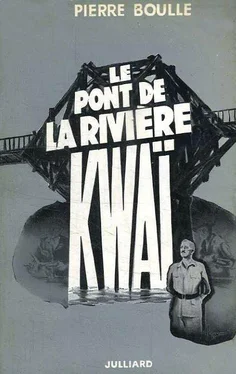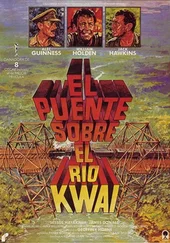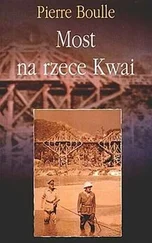Pierre Boulle
THE BRIDGE OVER THE RIVER KWAI
Translated by Xan Fielding
No, it was not funny; it was rather pathetic; he was so representative of all the past victims of the great Joke. But it is by folly alone that the world moves, and so it is a respectable thing upon the whole. And, besides, he was what one would call a good man.
JOSEPH CONRAD

The insuperable gap between East and West that exists in some eyes is perhaps nothing more than an optical illusion. Perhaps it is only the conventional way of expressing a popular opinion based on insufficient evidence and masquerading as a universally recognized statement of fact, for which there is no justification at all, not even the plea that it contains an element of truth. During the last war, “saving face” was perhaps as vitally important to the British as it was to the Japanese. Perhaps it dictated the behavior of the former, without their being aware of it, as forcibly and as fatally as it did that of the latter, and no doubt that of every other race in the world. Perhaps the conduct of each of the two enemies, superficially so dissimilar, was in fact simply a different, though equally meaningless, manifestation of the same spiritual reality. Perhaps the mentality of the Japanese colonel, Saito, was essentially the same as that of his prisoner, Colonel Nicholson.
These were the questions which occupied Major Clipton’s thoughts. He, too, was a prisoner, like the five hundred other wretches herded by the Japanese into the camp on the River Kwai, like the sixty thousand English, Australians, Dutch, and Americans assembled in several groups in one of the most uncivilized corners of the earth, the jungle of Burma and Siam, in order to build a railway linking the Bay of Bengal to Bangkok and Singapore. Clipton occasionally answered these questions in the affirmative, realizing, however, that this point of view was in the nature of a paradox; to acquire it one had to disregard all superficial appearances. Above all, one had to assume that the beatings-up, the butt-end blows, and even worse forms of brutality through which the Japanese mentality made itself felt were all as meaningless as the show of ponderous dignity which was Colonel Nicholson’s favorite weapon, wielded as a mark of British superiority. But Clipton willingly gave way to this assumption each time his C.O.’s behavior enraged him to such an extent that the only consolation he could find was in a wholehearted objective examination of primary causes.
He invariably came to the conclusion that the combination of individual characteristics which contributed to Colonel Nicholson’s personality (sense of duty, observance of ritual, obsession with discipline, and love of the job well done were all jumbled together in this worthy human repository), could not be better described than by the single word snobbery . During these periods of feverish investigation he regarded him as a snob, a perfect example of the military snob—a type that has been slowly and elaborately built up since the Stone Age and by its tradition guaranteed the preservation of the species.
Clipton, however, was by nature objective, and had the rare gift of being able to examine a problem from every angle, The conclusion he had reached having somewhat calmed the brainstorm which certain aspects of the Colonel’s behavior caused him, he would suddenly feel well-disposed and recognize, almost with affection, the excellence of the C.O.’s qualities. If these were typically snobbish, he reasoned, then the argument need be carried only one stage further for the noblest sentiments to be likewise classified as such, until even a mother’s love would eventually come to be regarded as the most blatant sign of snobbery imaginable.
In the past, Colonel Nicholson’s high regard for discipline had been a byword in various parts of Asia and Africa. In 1942 it was once again in evidence, at Singapore, during the disaster which followed the invasion of Malaya.
When orders came through from headquarters to cease fire, a group of young officers in his battalion had planned to make their way down to the coast, get hold of a boat, and set sail for the Dutch East Indies. Although admiring their zeal and courage, Colonel Nicholson had hindered their scheme with every means at his disposal.
To begin with, he had tried to win them over by pointing out that this venture was a direct contravention of the instructions he had received. Since the commander in chief had signed the surrender for the whole of Malaya, not one of His Majesty’s subjects could escape without committing an act of disobedience. As far as he could see, there was only one line of conduct possible: to stay put until a senior Japanese officer turned up to accept the surrender of himself and his unit and of the hundreds of stragglers who had managed to escape the massacre of the last few weeks.
“A fine example it would be for the men,” he had exclaimed, “if their officers failed in their duty!”
His argument had been rendered additionally forceful by the piercing look of resolution which he always assumed in moments of crisis. His eyes were the color of the Indian Ocean on a calm day; and his features, which were always in repose, were the clear reflection of a guiltless conscience. His fair, reddish mustache was the mustache of an unruffled hero; and his ruddy complexion was evidence of a sound heart regulating a smooth, easy circulation perfect in its efficiency. Clipton, who had served under him throughout the campaign, never ceased to wonder at this living example of “the Indian Army officer,” a type which he had always considered legendary, but whose reality was now proclaimed so loudly every day that it invariably caused him these alternating bouts of anger and affection.
Clipton had pleaded the young officers’ case. He approved of it and said so. Colonel Nicholson had taken him to task and declared himself painfully surprised to see a middle-aged man in a highly responsible position sharing the wild aspirations of a lot of hot-headed youngsters and encouraging the sort of thoughtless escapade that can cause nothing but harm.
Having explained the reason for his attitude, he had issued strict and definite orders. All officers, N.C.O.s, and men were to stay put until the Japanese arrived. Their surrender was not of their own choice; none of them, therefore, should feel in any way humiliated. He, and he alone, would shoulder the responsibility on behalf of the whole battalion.
Most of the officers had given in to him; for his power of persuasion was considerable, and his authority immense, while his unquestionable personal courage made it impossible to attribute his conduct to any motive except sense of duty. Some of them had disobeyed orders and disappeared into the jungle. Colonel Nicholson had been genuinely grieved by their behavior. He had posted them as deserters, and with growing impatience had waited for the Japanese to appear.
In preparation for their arrival, he had worked out in his head a ceremony which would bear the stamp of quiet dignity. After considerable thought he had decided, as a symbolic act of submission, to hand over the revolver which he wore on his hip to the enemy colonel in charge of the surrender. He had rehearsed the gesture several times and had made certain of being able to take the holster off in one easy movement. He had put on his best uniform and seen that his men tidied themselves up. Then he had ordered them to fall in and pile arms and had inspected them in person.
Читать дальше












